About
Special News
Logan's Page
Jacoby's Page
Our Travel Index
Tracks Ahead Related Trips
Contact
China - 2003
Originally written for the Tracks Ahead Website.
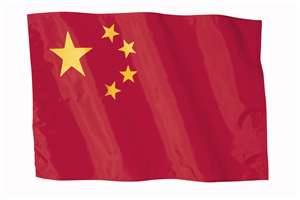
|
Not your normal tourist trip to this country. |
October 17/18
We are off again, on the first major trip of the sixth season of Tracks Ahead. Normally, we save he big overseas trips until we have our sea legs, but this time it worked just the opposite. The impending disappearance of steam power (or dieselization) prompted us to take advantage of a Trains Unlimited Tours trip to see what may be the last days of steam on a large scale, Class 1 railroad, anywhere in the world. So we are off to Jenjing Pass, which is the gateway to the Gobi Desert and Inner Mongolia in North Central China. We had an uneventful flight out of Milwaukee late in the day, and connected with a 1 AM flight out of San Francisco. Our fourteen-hour flight takes us to Seoul, Korea, and then on the Beijing.
Actually, there were only a couple of
hours in the 18th, as we effectively loose Saturday as we cross the
international date line. Of course, we are rewarded with two days
when we come back, and will arrive before we left. China is
thirteen hours ahead of US Central Time. We got a Boeing 777,
which turned out to be a very nice aircraft. There was plenty of
room between the seats, even though we snagged an exit row. I may
decline that on the return flight, as there really is no place to put
anything. We watched a couple of films, and tried to sleep a
little bit. And we pulled into Incheon Airport in Seoul, Korea
pretty much right on schedule. 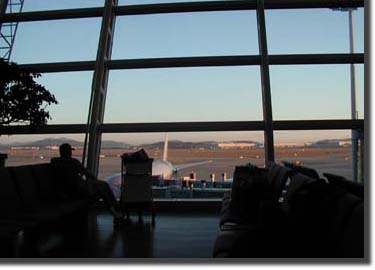 We
had about a three hour layover in Seoul, and then got back on the same
plane for the two hour flight over to Beijing. And then the fun
started. While we all made it to Beijing, Mr. Tripod decided that
he really didn’t want to leave the US, and so stayed in San Francisco.
And while we were trying to deal with the missing tripod case, which
also contained a light stand and the audio boom, all tour and airplane
passengers poured through Customs, which then had nothing to do until we
showed up. And guess who was their toy of the day? Yep.
Us. Seems that we didn’t have the correct stamps for getting the
camera in the country. The Chinese guys on our end protested
heartily, but to no avail. So at the present time, the camera has
been impounded at airport customs, and we have to do some footwork on
Monday to see about getting it released.
We
had about a three hour layover in Seoul, and then got back on the same
plane for the two hour flight over to Beijing. And then the fun
started. While we all made it to Beijing, Mr. Tripod decided that
he really didn’t want to leave the US, and so stayed in San Francisco.
And while we were trying to deal with the missing tripod case, which
also contained a light stand and the audio boom, all tour and airplane
passengers poured through Customs, which then had nothing to do until we
showed up. And guess who was their toy of the day? Yep.
Us. Seems that we didn’t have the correct stamps for getting the
camera in the country. The Chinese guys on our end protested
heartily, but to no avail. So at the present time, the camera has
been impounded at airport customs, and we have to do some footwork on
Monday to see about getting it released.
October 19
My first impressions of Beijing were:
Heavy smog. It made a hot day in Los Angeles look clean.
Lots of small shops, lots of heavy traffic (even though it was Sunday)
and lots of lots of hustling people. Once we checked into the
hotel, John and I went for a walk of a couple of blocks. Talk
about being on display. Wow. We certainly are stared at.
We went into a small grocery store, just to check things out. Lots
of familiar looking things with unfamiliar names. And some things
that I was totally mystified with. Traffic was by bicycle, one
lung (or maybe two cylinder) old delivery trucks, and lots of VW
products. Late in the afternoon, we then were all driven down into
the center of Beijing for a welcoming dinner and floor show. It
was kind of touristy, but OK. The food was similar to what we
think of as Chinese food in the US, although people had told us it would
be pretty different. Perhaps this was somewhat of a Westernized
place. And whether it was in the center of town, I have no clue. We
drove for a long time, and I kept drifting in and out of sleep. I
remember eye searing neon signs, heavy traffic, and miles of buildings.
Oh. The floor show was –like I said, touristy, with the standard
costumed dancing men and women, and heavy on the Chinese music that
always sounds a little disharmonious to my Western ears.
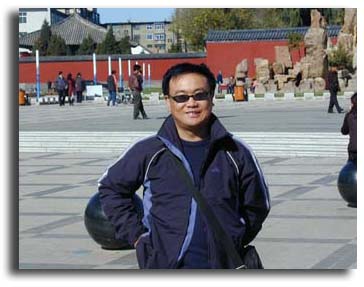
I had made arrangements for a private guide for the TV crew. This turned out to be Sheng Xian Qain, who worked for China International Tourist Services, and whose hometown was Changchun, a city we would visit later in the trip. After dinner, Mr. Sheng and I dropped off the tour group at the Southern Beijing Railroad Station for their night ride up to Reshui, which is at the foot of Jenjing Pass. I helped Mr. Sheng with the baggage and so got a rather whirlwind tour of the train station which was more than a little grubby. And then a long drive by cab back to the hotel and bed. Gail is the only woman on the trip, other than the tour guide’s wife, Miriam. She is from Peru. The rest are the usual assortment of US, Australian, and British railfans. I'm dead tired, but excited.
October 20
Up and rested and off to breakfast, which was made up of things I was mystified by. I ate a little of several items. Some were good, and some weren’t. I managed to track down the tripod, and it will be here Tuesday at 11 AM. Mr. Sheng is working on the camera situation, and I’m cooling my heels. It is very foggy this morning. I had a good nights sleep, which is probably more than I can say for the crew who was on the train. But with these trips, everyone has to remember - "It’s not just a job, it’s an adventure." These Trains Unlimited Tours are billed as mild adventure tours, and so you are never quite sure what will happen. Even the best of itineraries sometimes go by the wayside.
Most of the day was spent sitting around the hotel, watching Mr. Sheng make lengthy phone calls to try to get the camera issue resolved. He basically needed two stamped documents. One was from the local government, which turned out to actually be in Hanchow Province, which was quite a ways from Beijing and his home base. We did get that document. But then we had to make our way through the byzantine labyrinth of the Beijing Diplomatic Department, which was somehow connected to the Customs Department. We tried the Customs people at the airport again with the one document, but were rebuffed. And before you knew it, the day was over without much accomplished.
Dinner was Mr. Sheng’s idea of Chinese Boil in a Bag dinners. It consisted mostly of a tub of dried noodles, to which you added hot water. It was OK, none the less. Lots of phone calls, but discouraging news all around. It seems that there is always one more signature, and one more form.
October 21
After a restless night worrying about the camera, dawn finally raised it’s head. And a lovely sunny day it was too. We decided to go to downtown Beijing to see a personal friend of Mr. Sheng’s who was with the Diplomatic Corp. As I was to later learn, most business in China is done through personal relationships. I may be incorrect, but it seems that if you want to get something accomplished, you have to know someone, or at least have had some sort of a relationship with them. It wasn't like calling the Ajax Widget Factory and saying, "I want a thousand widgets. How much and when can you deliver." First you had to develop some business (or personal) friendship with someone at the Ajax Widget Factory. Then you could ask about cost and delivery, but only after preliminary chatting about family, mutual friends, the weather, and whatever else might make things comfortable. It was very lengthy and frustrating to my way of doing things. But then I guess I would be just seen as uncultured and rude.
We caught a shuttle to downtown through heavy traffic, and arrived at Old Man’s apartment. He and his wife were retired, and lived in a very nice fifth floor two level flat. Lots of blond wood and appliances that worked. Mr. Sheng would not tell me his name, but he must have been pretty high up in the government, as there were at a lot of pictures of the man with ex-premiers, Army heads, and the like. It turns out that Mr. Sheng used to date his daughter, hence the connection. Like most things in China, there was a great deal of family inquiry, platitudes, etc. before we settled down to business. The man could help us, but – like yesterday –needed one more form from the local government. It sounded promising, but while wheels were put in motion, nothing really transpired. Old Man and his wife kept cutting up fruit for us. I tried to indulge as sparingly as possible, but not sparingly enough, as the late evening and night would attest. At least I learned early on that you only drink, brush teeth, etc. with bottled or boiled water and eat only things that have been well cooked. Mr. Sheng and I had lunch at a pretty upscale restaurant, which was located down a pretty dingy alleyway. I was complemented for my use of chopsticks. All day, I was the only foreigner around. And did people stare. Oh my. I finally scored the name of a guy at the NBC New Bureau here, and while my contact was in Bali (tough), the woman on the phone passed along my number to a rental outfit. We had contacted another company, but the communication problem was evident when we showed up expecting a DVC Pro format camera and were shown an handheld consumer grade miniDV. But at that point the NBC recommended rental company called with an offer of a 16x9 DigiBeta and kit. The price was a bit high, but what was I to do? Of course, these are all cash deals and I was told they would like the money in US dollars. We then headed off to several banks, only to be told that advances on my Visa could only be made in RMB (Chinese Yuan) since the end of September. So back in contact with the rental company, to learn they would accept RMB as payment. The final total bill was RMB38,200, which is quite a packet of cash. And the only place that could handle it was the airport money exchange. Even the Bank of China wouldn't advance on the Visa card. So off we headed to the airport, where our tripod was finally waiting. We got the cash, got the tripod, packed our bags, and headed for the rental company which was on the way to the South Train Station.
A note on Beijing car drivers. Oh my. It is most amusing to watch drivers cut each other off, drive two to a lane, pass on the right, try to just get everywhere as fast as possible. And throw in all the bicycles, and the pedestrians, and it is quite a lunatic adventure. I don't think I saw a single stop sign in all of China. Many of the traffic lights have countdown clocks as to when they will change. And everyone just goes. Those turning left try to run as many cars through nose to tail, while oncoming traffic tries to plow through all of it. Amazingly, we saw few accidents, but did see a couple of close calls, caused mainly by people hesitating. The other disconcerting thing, is that night driving does not call for headlights - only parking lights. Being a pedestrian is fun. You have to sort of watch out of the corner of your eye, because if the drivers think you see them, they think you will wait. If they think you don't see them, then they will try to avoid you.
We got to
the rental place, which was Tribal Productions of Asia. It was run by a
couple of Aussies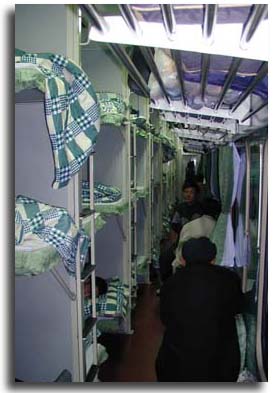 (of course) one from Brisbane and one from Adelaide. They could
have gotten me an HDCam, but it wouldn’t have been in until next week.
And seems that the Chinese customs are impounding a lot of cameras
lately. No idea why, but we just happened to get caught up in it.
If I hear one more time, “This is China”-meaning that anything
resembling Western reality is totally out of context – I shall scream.
So the camera is brand new and a nice unit. I hope John likes it.
I got it, and took batteries just because I wasn’t sure ours would fit,
and two cases of tape.
(of course) one from Brisbane and one from Adelaide. They could
have gotten me an HDCam, but it wouldn’t have been in until next week.
And seems that the Chinese customs are impounding a lot of cameras
lately. No idea why, but we just happened to get caught up in it.
If I hear one more time, “This is China”-meaning that anything
resembling Western reality is totally out of context – I shall scream.
So the camera is brand new and a nice unit. I hope John likes it.
I got it, and took batteries just because I wasn’t sure ours would fit,
and two cases of tape.
We made the station, and scored two tickets in hard sleeper. Now that was an adventure. Three berths high, and people packed in. And I was the only foreigner. Conversation was difficult, but with Mr. Sheng's help, I managed to learn a bit about some of my compartment mates. Most were from our destination, Chifeng City, and were most proud of the fact that they had helped stop the SARS epidemic last year. The train ride was smooth, and I slept better than expected. Tomorrow we can finally get this show back on the tracks.
October 22
We pulled
into Chifeng City about an eight hour train ride north of Beijing.
With the help of our friends from last night,
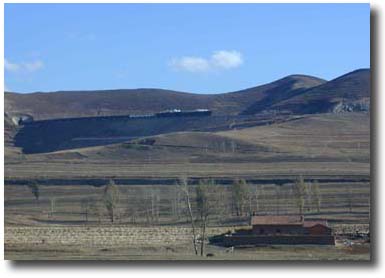 we
got a cab and headed for Reshui to catch up with the tour. The
trip took about three hours, and it is cold. The temperature is
around 0 degrees Celsius with a stiff breeze. The terrain looks a
lot like the Badlands of Wyoming. It is autumnal grey and surprisingly
sparsely populated. Due to some road construction, we were slightly
delayed in getting to Reshui. We would have been even more delayed
if I'd been driving, because there were no road signs. I guess you
just had to have been there once or something. At least, there
wasn't anything that I could see that resembled directional points to
anywhere. We got in a little after Noon, and John and Gail headed
out to try to cram a lot of runbys into the afternoon.
we
got a cab and headed for Reshui to catch up with the tour. The
trip took about three hours, and it is cold. The temperature is
around 0 degrees Celsius with a stiff breeze. The terrain looks a
lot like the Badlands of Wyoming. It is autumnal grey and surprisingly
sparsely populated. Due to some road construction, we were slightly
delayed in getting to Reshui. We would have been even more delayed
if I'd been driving, because there were no road signs. I guess you
just had to have been there once or something. At least, there
wasn't anything that I could see that resembled directional points to
anywhere. We got in a little after Noon, and John and Gail headed
out to try to cram a lot of runbys into the afternoon.
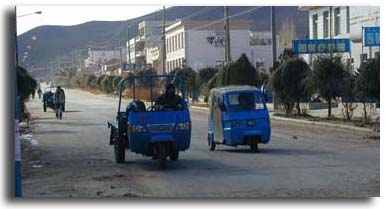
Initially,
I stayed close to the hotel room, paying for the change in diet and/or
water. I did manage to get to see the Chinese 2-10-2’s later in
the day. It really is an awesome sight, and one which will be lost
after 2005, and these engines are scrapped. Just listening to them
pound their way up the grades and whistles echoing through the mountains
is
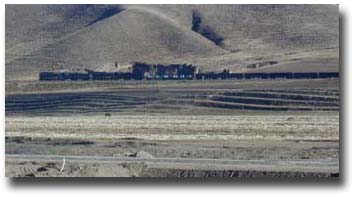 something
that I’m glad we came to capture. Now if we could just get it in
high definition, it would be better yet. I’m off for dinner, which
I think will be light. We really are out in the boonies. I
saw a lot of those three wheel single cylinder powered carts, but I saw
more donkey
something
that I’m glad we came to capture. Now if we could just get it in
high definition, it would be better yet. I’m off for dinner, which
I think will be light. We really are out in the boonies. I
saw a lot of those three wheel single cylinder powered carts, but I saw
more donkey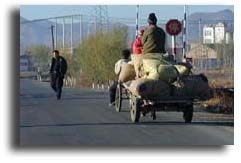 carts than that. They seem to grow a lot of corn and I’ve seen
lots of it drying in the sun, presumably to use as animal feed.
The town is rustic, to say the least. But the amazing this is that
I can get internet access at a cafe. Of course, I had to take a
flashlight to find my way, as well as Mr. Sheng to guide me.
Because this place was really buried back down an alley behind some
shops. Half the people in the place were playing on-line Doom and
King's Quest. And the price was a whopping sixteen cents.
One thing that we did continually find was a mix of old and new.
carts than that. They seem to grow a lot of corn and I’ve seen
lots of it drying in the sun, presumably to use as animal feed.
The town is rustic, to say the least. But the amazing this is that
I can get internet access at a cafe. Of course, I had to take a
flashlight to find my way, as well as Mr. Sheng to guide me.
Because this place was really buried back down an alley behind some
shops. Half the people in the place were playing on-line Doom and
King's Quest. And the price was a whopping sixteen cents.
One thing that we did continually find was a mix of old and new.
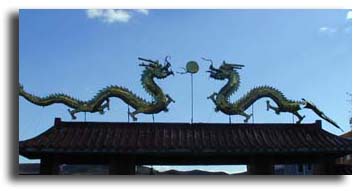 China
skipped right to cell phones, for example. So you could call
anywhere in China as a local call. Internet access was readily
available, as were places to call overseas. But plumbing was
spotty, and building repair seemed to be hit or miss.
China
skipped right to cell phones, for example. So you could call
anywhere in China as a local call. Internet access was readily
available, as were places to call overseas. But plumbing was
spotty, and building repair seemed to be hit or miss.
It will be an early night tonight. Tomorrow we are off to Daban to see the shops for light repairs and them off to another town.
October 23
We started
the day by heading for the railroad shops at Daban. About half the
group stayed to shoot things on the Jinjeng Pass, but we picked the
shops. And they were pretty cool.
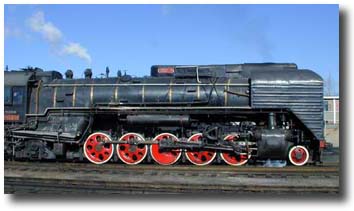 It
was really neat to get up close to these massive QJ class 2-10-2 locos.
This shop does coaling, watering, and some light repair. And they
even had steam powered coal shovels. Of course, the workers
immediately wanted to sell you pins, number plates, virtually any part
of the locomotives. I think you could probably buy the whole thing if
you could figure out how to get it shipped home. It is to bad
these things are going to be scrapped in two years. Their life
expectancy is complete. This whole operation belongs to the JiTong
Railroad, which was constructed in the 1980s at a pretty heft cost and
like most operations now in China, is a mixture of
It
was really neat to get up close to these massive QJ class 2-10-2 locos.
This shop does coaling, watering, and some light repair. And they
even had steam powered coal shovels. Of course, the workers
immediately wanted to sell you pins, number plates, virtually any part
of the locomotives. I think you could probably buy the whole thing if
you could figure out how to get it shipped home. It is to bad
these things are going to be scrapped in two years. Their life
expectancy is complete. This whole operation belongs to the JiTong
Railroad, which was constructed in the 1980s at a pretty heft cost and
like most operations now in China, is a mixture of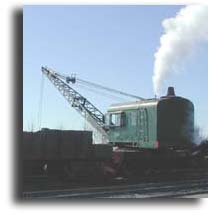 private and government money. It was built to connect the "three
Norths" - North Central, eastern, and western China. There are a
lot of minerals and coal and the line is heavily used. In fact,
there are over 36 trains a day lover Jenjing Pass. The locos were
purchased by the JiTong Railroad from China Rail in 1985 as used
equipment. They only had a twenty year expectancy at that point.
They are useful for the cold weather here on the Pass, but their
replacement is inevitable.
private and government money. It was built to connect the "three
Norths" - North Central, eastern, and western China. There are a
lot of minerals and coal and the line is heavily used. In fact,
there are over 36 trains a day lover Jenjing Pass. The locos were
purchased by the JiTong Railroad from China Rail in 1985 as used
equipment. They only had a twenty year expectancy at that point.
They are useful for the cold weather here on the Pass, but their
replacement is inevitable.
We
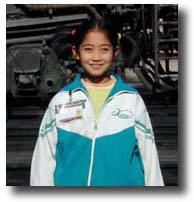 put
the Daban Director of Marketing on camera, and we’ll see if he makes the
final cut once we get home. We were also assisted by the little
girl in the picture. She kept picking flowers from the shop
grounds and giving them to us. Most building complexes had small
green spaces. These often contained small shrines, ponds, and
pagoda structures. We saw this often at both industrial complexes,
apartments and even in business districts.
put
the Daban Director of Marketing on camera, and we’ll see if he makes the
final cut once we get home. We were also assisted by the little
girl in the picture. She kept picking flowers from the shop
grounds and giving them to us. Most building complexes had small
green spaces. These often contained small shrines, ponds, and
pagoda structures. We saw this often at both industrial complexes,
apartments and even in business districts.
Lunch consisted of the usual "Tub 'O Noodles" and mystery beef sticks. Which actually are rather good. They taste a little like overgrown Vienna sausages. I would find out that I could live by eating the beef sticks and cheese crackers that my wife told me to bring along (she had been here before).
After that
is was a long, long, long bumpy ride back to Chifeng City. The
emptiness was vast. The area looks like Wyoming, only more of it.
There is agriculture, mostly in the way of corn. But it certainly looks
like an arid region. We all have a lot of questions, but can’t
seem to make ourselves understood well enough to get them answered.
So for four hours we plowed through a vast and wind swept emptiness,
punctuated only by three wheel trucks, burro carts hauling huge loads of
corn stalks,
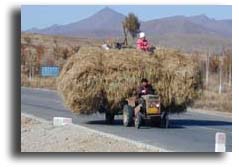 and
the occasional rather humble town. And loads and loads of brick
factories. Many were abandoned (we found out later). We were
told that it was cheaper to build a new factory, than to fix the old.
And all the bricks go to fuel the huge building boom in the country.
We were told that this is a sign of a poverty culture. You don't
worry about fixing anything, because you don't look further than the
next day. So saw lots (I mean vast amounts) of new construction.
Which was surrounded by building that looked to be maybe twenty years
old and
and
the occasional rather humble town. And loads and loads of brick
factories. Many were abandoned (we found out later). We were
told that it was cheaper to build a new factory, than to fix the old.
And all the bricks go to fuel the huge building boom in the country.
We were told that this is a sign of a poverty culture. You don't
worry about fixing anything, because you don't look further than the
next day. So saw lots (I mean vast amounts) of new construction.
Which was surrounded by building that looked to be maybe twenty years
old and
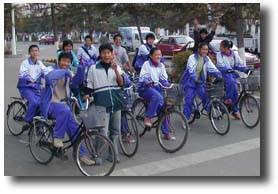 falling
to pieces.
falling
to pieces.
Once in
Chifeng City, we wandered around a bit, and got beset upon by a pack of
uniformed school kids, who wanted hand outs. We escaped, wallets
and watches intact. For a country that has no crime, there sure
are a lot of barred windows. A lot of people set up their shops
and trade wares right on the sidewalk. We are definitely strangers
and a curiosity.
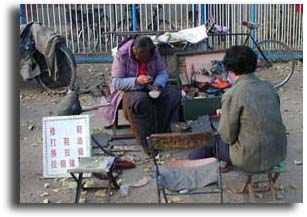 People
really do stop and stare at us. We had dinner, although none of us
is particularly hungry, and hopped a train in hard sleeper class for
Shenyang (the town formerly known as Mukden). Still no word on the
camera. We commented that we had seen no wildlife, no road kill,
and not really many birds. And definitely no airplanes, or even
contrails.
People
really do stop and stare at us. We had dinner, although none of us
is particularly hungry, and hopped a train in hard sleeper class for
Shenyang (the town formerly known as Mukden). Still no word on the
camera. We commented that we had seen no wildlife, no road kill,
and not really many birds. And definitely no airplanes, or even
contrails.
October 24
Well, hard sleeper class was not as refreshing this time around.
The track was rougher, and maybe I just wasn’t as tired. I slept
OK, and crew said that I still snore. We de-trained at Shenyang,
about 6:30 AM, and headed for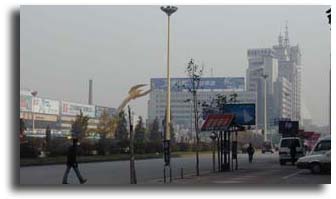 the hotel. What a big, bustling city, with a population of around
four million. What Reshui was to agriculture, this place seems to
be to commerce. Just as a note, on the way in I saw two dogs.
These are the first sign of any pets or even wildlife that we have seen.
We got to the hotel, only to find that the double rooms were available,
but not the singles. So we borrowed a double rooms,, and cleaned
up as best we could.
the hotel. What a big, bustling city, with a population of around
four million. What Reshui was to agriculture, this place seems to
be to commerce. Just as a note, on the way in I saw two dogs.
These are the first sign of any pets or even wildlife that we have seen.
We got to the hotel, only to find that the double rooms were available,
but not the singles. So we borrowed a double rooms,, and cleaned
up as best we could.
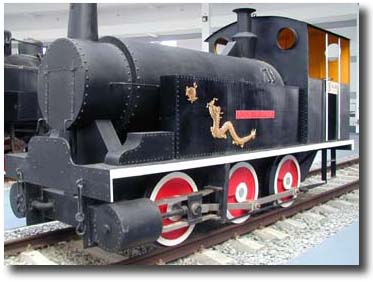 Then
it was the usual breakfast, and off to the Shenyang Railroad Museum,
which we had been lead to believe was bit of a dump. It was a
great surprise to find that quite the opposite was true. It was a
new building, having been open for only two months. The
locomotives were nicely displayed, and it was quite a pleasurable
experience. We got Dale Brown, the tour leader, on tape, and he
did a nice job of talking about the trip and things we have seen, and
will see.
Then
it was the usual breakfast, and off to the Shenyang Railroad Museum,
which we had been lead to believe was bit of a dump. It was a
great surprise to find that quite the opposite was true. It was a
new building, having been open for only two months. The
locomotives were nicely displayed, and it was quite a pleasurable
experience. We got Dale Brown, the tour leader, on tape, and he
did a nice job of talking about the trip and things we have seen, and
will see.
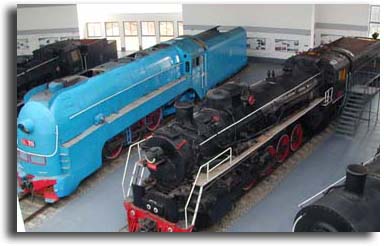
From there, we did the usual Mr. Toad’s Wild Ride to Benxi, which was
also quite a bustling place. And only about 20 kilometers from
North Korea. Our objective was the Benxi Steel Works, which is
still using SY class 2-8-2 locos for shunting. There were actually
quite a few of the locos, and while they all looked a bit tired, it was
still great to see these little engines pulling loads to and from the
mill. While the crew shot, Miriam, the wife of our tour leader,
and I went back into town to an internet café. For RMB3, I could
surf the net for an hour. And as usual, most of the people in the
place were playing on-line Doom. Miriam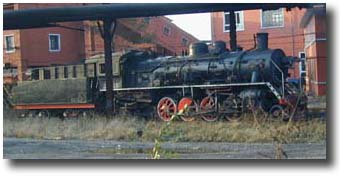 had received an email from Chris Skow, the Director of Trains Unlimited
Tours, and further communication from the head of CITS (China
International Tourist Service) which indicated that our camera was
supposed to have been released yesterday, and flow up to us. Our
guy, Mr. Sheng, has been out of mobile contact, as have the rest of the
Chinese tour leaders, because no one could charge phones on the train
last night. When Mr. Sheng called his office to confirm all this,
two of the people he called had no knowledge of the situation, and one
was unreachable. So we are still using the DigiBeta.
Tomorrow, as they say, is another day. But with it being Saturday, and
then Sunday, I’m sure nothing will happen. This is most annoying.
A note on the air quality here in China. It sucks. The air
is heavy in smog, due to the lack of any apparent kind of emission
standards. I’m not kidding. It is really foul. And in a place that
makes steel, it was even worse.
had received an email from Chris Skow, the Director of Trains Unlimited
Tours, and further communication from the head of CITS (China
International Tourist Service) which indicated that our camera was
supposed to have been released yesterday, and flow up to us. Our
guy, Mr. Sheng, has been out of mobile contact, as have the rest of the
Chinese tour leaders, because no one could charge phones on the train
last night. When Mr. Sheng called his office to confirm all this,
two of the people he called had no knowledge of the situation, and one
was unreachable. So we are still using the DigiBeta.
Tomorrow, as they say, is another day. But with it being Saturday, and
then Sunday, I’m sure nothing will happen. This is most annoying.
A note on the air quality here in China. It sucks. The air
is heavy in smog, due to the lack of any apparent kind of emission
standards. I’m not kidding. It is really foul. And in a place that
makes steel, it was even worse.
To continue, we popped off a couple of shots in the downtown area of Benxi, and headed back to Shenyang. Man, if you thought day driving was a trip, the situation at night is even crazier. Here is the picture. A good, smooth freeway, of four lanes. Toss in the three wheel carts, longer straight trucks, some semi trailers, and then add high powered Audis and Hondas blowing up the left lane with their left blinker on and going as fast as they can. Turn off everyone’s lights except for parking lights, and then – just for excitement – toss in a couple of factories along the way of this limited access road, which allow access by bicycle and pedestrians. And of course, none of them have any lights, and they are all dressed in black. We all wonder what the pedestrian fatality rate is. We about wiped out an old guy on a bike. And yet, we have seen no dented vehicles, although I have seen a couple of accidents while I’ve been here. China is building. Oh my, are they building. They are building huge office complexes, rows of apartments, and gated communities that appear luxurious even to our Western eyes. But they are destroying the air and water to do it. Maybe they think they can fix it later. I don’t know. But there is a building boom here. One of the guys on this tour who was here two years ago said that he didn’t even recognize Shenyang, in that it had changed so much. But when you have nearly two billion people, you have to give them something to do. Apparently the One Child Policy applies only to the areas around Beijing and around the coast. There is more freedom in the Autonomous Regions. But there are people everywhere. And cleanliness does not seem to have a high priority. Sure, the streets are swept, and there isn’t much litter, but everything you touch has been touched by so many, that it is impossible to keep things sanitary. I think the Asian toilet is probably a partial result of that issue. After all, no part of your body has to touch anything.
I tried the internet here at the hotel tonight, and it was RMB40 for a half hour. What a rip. But the hotel is definitely a four star operation. Tomorrow we are off to another steel mill and Coal Mine Railroad in Tiefa. I think I mentioned that we are fairly close to North Korea. We sort of wanted to take a trip just to see the border, but our Chinese guides said that there wasn't enough time.
October 25
Today
dawned bright and sunny. The air on Shenyang was still a little
thick, but
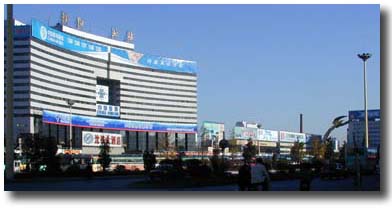 better
than yesterday. Today being Saturday, there were a lot of farmer
markets, so the bike traffic was a little more intense. We checked
out of the hotel and headed to Anshan, which was the home of the No.2
steel plant.
better
than yesterday. Today being Saturday, there were a lot of farmer
markets, so the bike traffic was a little more intense. We checked
out of the hotel and headed to Anshan, which was the home of the No.2
steel plant.
Along the
way, we stopped in a small town (well, nothing on the map is small, but
I didn't write down the name) and shot some footage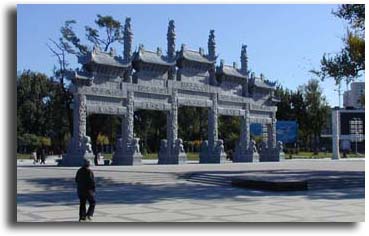 of a temple complex under restoration. We also passed vast fields
of
of a temple complex under restoration. We also passed vast fields
of
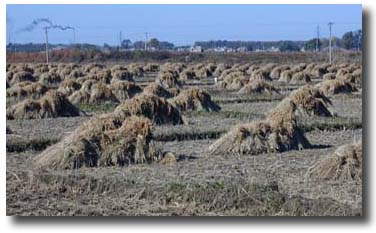 rice,
all harvested by hand.
rice,
all harvested by hand.
Our arrival
in Anshan gave us a look at a major steel mill. This operation,
producing 38% of China’s steel output. It had been started in 1938 and
was recently ISO 9001 certified. They were using beautiful SY
class 2-8-2
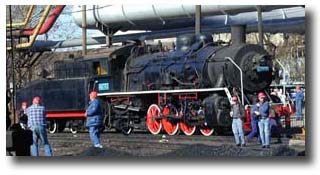 steam
locos to do the yard shunting for the mill. There were also some
diesels, but it was the steam that we came to see. And they were
all gorgeous. They were highly polished, cleaned, and just
sparkling beauties under the October sun. The crews took very good
care of these engines, painting and polishing them to perfection.
It was obvious that there was a lot of price in this operation. We
spent about two hours watching things work, and then were treated to a
look at the pig iron operation, and the steel hearths.
steam
locos to do the yard shunting for the mill. There were also some
diesels, but it was the steam that we came to see. And they were
all gorgeous. They were highly polished, cleaned, and just
sparkling beauties under the October sun. The crews took very good
care of these engines, painting and polishing them to perfection.
It was obvious that there was a lot of price in this operation. We
spent about two hours watching things work, and then were treated to a
look at the pig iron operation, and the steel hearths.

And then it
was back on the bus for a four hour ride to Tiefa. We ran a little
late, as traffic was worse than normal. Night driving here is
quite an event. We will roll off some tape, because people at home just
will not believe it. We saw three accidents. It occurred to
me that in the US, we spend so much time trying to protect people from
their own stupidity, but in the rest of the world, Darwinism just takes
it’s course. Lets face it. If you try riding a bike, with no
light, in the middle
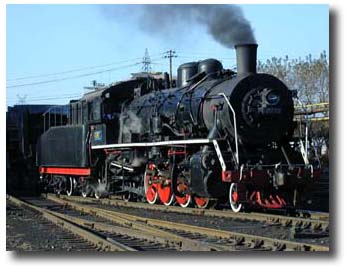 of
heavy traffic at night, chances are you are going to get hit. The
larger bus wanted dinner, so we tried to stop at a truck stop, which I
thought might be rather interesting, but the majority voted we push on
to the next town. I think the truck stop would have been cleaner.
One interesting thing was the number of small fires along the roads in
the towns. We have been seeing people buy rolls of yellow paper for the
last day or so. It seems that on a lunar event, people burn the
paper in remembrance of deceased relatives. Yellow is used to
denote money on the other side of the spirit world.
of
heavy traffic at night, chances are you are going to get hit. The
larger bus wanted dinner, so we tried to stop at a truck stop, which I
thought might be rather interesting, but the majority voted we push on
to the next town. I think the truck stop would have been cleaner.
One interesting thing was the number of small fires along the roads in
the towns. We have been seeing people buy rolls of yellow paper for the
last day or so. It seems that on a lunar event, people burn the
paper in remembrance of deceased relatives. Yellow is used to
denote money on the other side of the spirit world.
The other thing today were the vast wheat fields, all hand harvested. We got into the hotel late, and found all the bathtubs running rusty water, just to clear the pipes. It will make taking a shower interesting. I would not recommend doing any laundry here. The adventure continues. Still no camera. The calendars in our rooms are interesting. John and Gail have calendars that show fancy automobiles and pretty girls for each month. I have a military version that show pretty girls, but all in different military garb. And I managed to catch a very polished half hour recruiting video on one of the TV stations which featured lots of MTV dancers and the like. I think I want to enlist. Yea, right.
October 26
We opted to do the later tour today, and left at 9 AM, rather than 7:30. We all headed off to the Tiefa Railway Station. The crew shot material, and I found an internet café inside the station where I attempted to send some rather scathing emails concerning the lack of resolution concerning the camera situation. The cost for an hour’s work was just one Yuan. Of course, the keyboard was sticky and had seen a lot of action. And the usual contingent of on-line Doom players were hard at work. The proprietor seemed to live there, as there was a cot and kitchen facilities, right in the station. We shall see what –if any – results I see.
From there
we went out to a major rail junction. The Tiefa Coal Mining
Railroad serves double duty, in that it hauls coal and other mining
materials, and also serves as the regional commuter train.
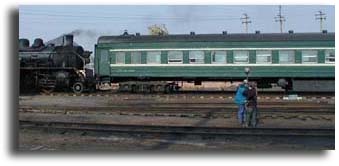 There
are two lines, one running North South and the other East West. We
shot some material at the crossing, but today was extremely windy, and
as they say here, “One province was moving to another, one grain of dirt
at a time.” We hung around there for a while, and then went off to
the mine locomotive coaling facilities. We saw some locomotive
movement, particularly of the little SY class, but things were pretty
slow, as it is Sunday. I did two short standups, one with a man from
Colorado, and a second with a British man. I am probably
prejudiced, but the Brits always sound so polished and erudite on
camera. I just love the accent. We then headed out into the
boonies for a shot of locomotives on a branch. The bus driver took
the bus down a very narrow road, and the look on a Chinese farmer’s face
was priceless. We were partially rewarded with a doubled headed
coal train,
There
are two lines, one running North South and the other East West. We
shot some material at the crossing, but today was extremely windy, and
as they say here, “One province was moving to another, one grain of dirt
at a time.” We hung around there for a while, and then went off to
the mine locomotive coaling facilities. We saw some locomotive
movement, particularly of the little SY class, but things were pretty
slow, as it is Sunday. I did two short standups, one with a man from
Colorado, and a second with a British man. I am probably
prejudiced, but the Brits always sound so polished and erudite on
camera. I just love the accent. We then headed out into the
boonies for a shot of locomotives on a branch. The bus driver took
the bus down a very narrow road, and the look on a Chinese farmer’s face
was priceless. We were partially rewarded with a doubled headed
coal train,
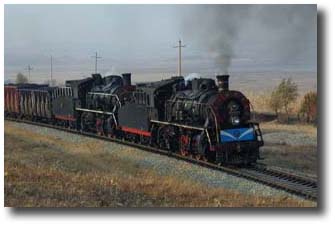 but
that was it. We waited in the wind and cold for about two hours, but
that was all there was on that line. And the light fades at 5, so
we headed back to the hotel. I asked Mr. Sheng what time people
went to work. China spans five time zones, yet only recognizes one
– Beijing Standard Time. He said people adjust their hours
regionally, with some people not coming into work until Noon, in hot
summer months. I asked what if I was on the east side,, and wanted
to do business with a company on the West side. How would I know
when they were open? He said, you just keep calling at different
times until you find someone. It sounds pretty inefficient to me.
but
that was it. We waited in the wind and cold for about two hours, but
that was all there was on that line. And the light fades at 5, so
we headed back to the hotel. I asked Mr. Sheng what time people
went to work. China spans five time zones, yet only recognizes one
– Beijing Standard Time. He said people adjust their hours
regionally, with some people not coming into work until Noon, in hot
summer months. I asked what if I was on the east side,, and wanted
to do business with a company on the West side. How would I know
when they were open? He said, you just keep calling at different
times until you find someone. It sounds pretty inefficient to me.
I also found out what happened to all the birds and wildlife. Former Chairman Mao decided that the birds were eating to much of the rice and grain crop, and ordered the people to eliminate the birds. They did so by making so much noise that the birds could not land to rest, and literally fell dead from the sky. And crop famines during the same period pretty much meant that people ate whatever wildlife they could find, and so cleared the land. Actually, it sounds to me like an ecological nightmare. The birds are starting to some back, and we have seen some evidence of rabbits in rural areas. How much more there is, is unknown to this writer. But it is late in the day, and after another dinner of Chinese food, I’m watching some local TV and heading for bed. I certainly hope we can get some resolution on the camera issue this week. And I hope it is still safe in Customs.
October 27
After
breakfast at the hotel, we again headed down to Tiefa station for more
railroad footage. I checked the email, and found a note from the
tour operator confirming my requests to the Chinese Tour operator.
I then was able to reach a Miss Zebhong in the Beijing CITS office, who
indicated that it appeared that we were very unlikely to get our camera
and lenses back until we left the country. It is raining and
sleeting, and considering all the particulate matter in the air, we are
thinking that we may be looking at an acid rain situation. As a
result, we are keeping our lenses and equipment dry. Besides, it
is so gray and yucky, that it really isn’t worth shooting. Of note
were the number of people living right on the coal mine grounds.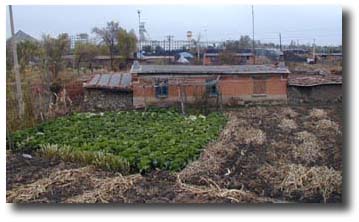 Very humble, and I can’t imagine what the people do for managing to
maintain any kind of cleanliness in air or living. And the food
grown must have an odd taste.
Very humble, and I can’t imagine what the people do for managing to
maintain any kind of cleanliness in air or living. And the food
grown must have an odd taste.
But for now, we are off to the provincial capitol, Changchun. Which also happens to be the hometown of our guide. I think I mentioned that maintenance doesn’t seem to be of much concern. If something just gets old, you tear it down and build anew. Also, there is a dichotomy of using LED traffic signals to control donkey carts. Also, in the West, labor is the most expensive part of any job. Here it is capitol. It is cheaper to use people to load a truck, than to buy a front end loader. The rain has changed to a snow/sleet mix. It is quite a dismal day, It is cold, windy, damp, and the countryside looks deserted.
We stopped
at the Tiefa locomotive shops, and got a pretty good treat of steam
locos being rebuilt.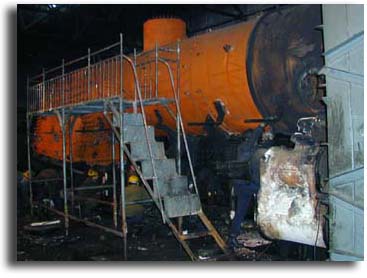 There was one woman, working on scrapping coal residue from the tender.
She was wearing boots with heels, and relatively fancy stretch pants.
Are those the only clothes she has? Perhaps, as many of the
workers seem to have very little.
There was one woman, working on scrapping coal residue from the tender.
She was wearing boots with heels, and relatively fancy stretch pants.
Are those the only clothes she has? Perhaps, as many of the
workers seem to have very little.
After the usual lunch of noodle soup, which I have decided not to eat after only two servings, we started the rainy drive to Changchun. Thankfully the road was pretty good, and we are still amused that there are two toll booths at each provincial border crossing. There is one for the province you are leaving, and the other for the one you are entering. There really wasn’t any automobile traffic – only trucks, most all of which are missing taillights. Changchun appears to be a very lovely town. There is an appearance of nice shops, upscale areas, and more than twenty universities.
Dinner was at the Goose Restaurant, a very lovely place. I wanted to run a pool to see just how many bamboo plants were used for area screening. The food was excellent, and the staff was superb. And they had imported beer - Corona! Then it was to the Shangri-La Hotel, which of course turned out to be a five star place. That figures, as we are only here one night. I have been talking to some of the other people on the tour, about coming here in March, as opposed to October of next year. It appears that March would just be too cold, not only for us, but for the equipment as well. Temperatures of thirty below were reported, and frankly, I don’t think any of us need that. So I will shoot for October, although I doubt that I will be able to make the trip. And all this is assuming that CITS makes good on giving us a free trip to repeat their mistakes. John and Gail went out to shoot a little neon about the town. Everywhere we go, people are intensely curious about us. All wish to visit the United States at some point. It has been a day of relative inactivity. I’m tired and am going to bed. The day’s impressions? Well, there is a Sam’s Club and KFC here in Changchun. But on a more serious note, once again, the evidence of a vast gulf between the poor and the well-to-do. The little running man on the walk lights. As the lights get closer to changing to red, the speed of the pedestrian legs on the walk sign speeds up. And also lots of neon and upscale shopping here in Changchun.
October 28
A bright
and sunny day dawned. And still no news from home on the camera.
As I mentioned yesterday, Changchun is quite a lovely town. There
about six million people here, and is it known as the City of
Universities, Forests, Science/Technology, Cinema, or Automotive.
Take your pick. It has them all. Additionally, it has some
great shopping, restaurants, and all the trappings of a
 very
cosmopolitan western city. I liked it better than Beijing.
There are 26 universities, an Audi plant, major cinema studios, and lots
of forestry products. The temperature ranges from about –8 to 82,
so much like Milwaukee. But a heck of a lot more with it. Of
note is the picture of the computer with the Green Bay Packers logo.
I couldn't resist!
very
cosmopolitan western city. I liked it better than Beijing.
There are 26 universities, an Audi plant, major cinema studios, and lots
of forestry products. The temperature ranges from about –8 to 82,
so much like Milwaukee. But a heck of a lot more with it. Of
note is the picture of the computer with the Green Bay Packers logo.
I couldn't resist!
We
abandoned the tour today, and started by shooting some material
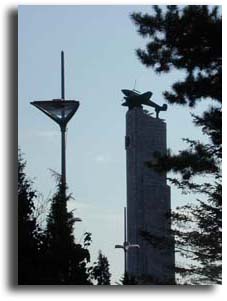 around
town. In one square, we found a statue with what looked like a
Sturmovick WWII Russian fighter on the top. It was a statue to
commemorate the Russian airmen who
around
town. In one square, we found a statue with what looked like a
Sturmovick WWII Russian fighter on the top. It was a statue to
commemorate the Russian airmen who
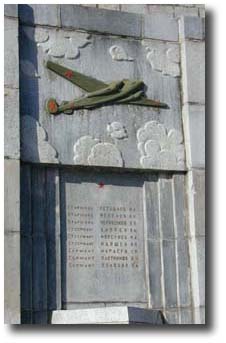 died
fighting to push the Japanese out of the area at the end of World War
Two.
died
fighting to push the Japanese out of the area at the end of World War
Two.
Then we went –shopping. I had no idea that all six million people would be out in the stores on a Tuesday, but it certainly seemed they were. The stores were a bit overwhelming. And externally different from a US store. As an example, let's use a store like Marshall Fields in Chicago. This a major department store, housing many departments, covering a city block, with display windows all along the outside. In China, that same store would be the same on the inside, but outside, would consist of more smaller shops where the "western" display windows would be. So unless you could read the Chinese signs, or knew what to look for, you had no idea that behind all these little shops would be the a major department store. Another interesting thing was that you paid the clerks directly. And there were a lot of clerks. Many more than a comparable store in the US. But the selections were vast, and comparable to a US store. And there were a lot of people. I don't know what they were all doing here in the store on a Tuesday, but when I asked, I was told that, "they were shopping." with a quizzical look. Apparently the sarcasm was lost on the tour guides.
We had
lunch at a great restaurant, and then shot the light rail system. This
operation was brand new,
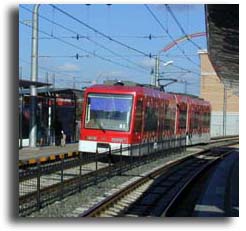 and
was finished last October. It runs about 15 kilometers and there
are expansion plans for spur lines. It was the usual light rail
operation, and it is something that will never catch on in this country.
It seems to work all over the rest of the world,
and
was finished last October. It runs about 15 kilometers and there
are expansion plans for spur lines. It was the usual light rail
operation, and it is something that will never catch on in this country.
It seems to work all over the rest of the world,
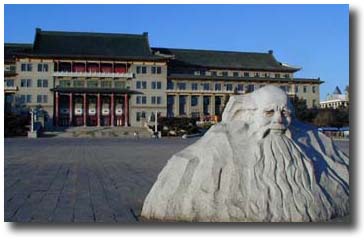 but
the US just isn't ready for it.
but
the US just isn't ready for it.
We then headed to the square in front of Jinling University, which is the oldest in Changchun. We watched people flying kites and just shot some minor city material.
Our departure was via soft sleeper. I was sad to see Changchun fade, as it was quite a cosmopolitan place. We are still gawked at.
October 29
Soft
sleeper is definitely better than hard sleeper. We all actually got a
pretty good rest, except that the locomotive driver was a bit rough. We
awakened at 6 AM in Jiamusi, in northeastern China. Actually, we are
only about 120 km from the Russian border. We got into our hotel,
and headed north to Harbin, and another coal railroad. This time, it
seemed as though every location we picked, we should have been someplace
else. We did get some standard MOC standups done, and then did
some passenger train passes late in the day. The mine was a huge
open pit operation, and was
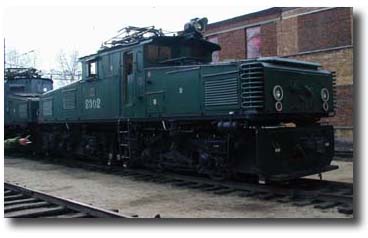 running
a few Alligator electrics.
running
a few Alligator electrics.
The weather was a mixed bag of sun, snow, and cloud. It got dark about 4:30, so we headed back for the hotel. And did we get a surprise. When John and Gail were at breakfast this morning, a woman sat down and asked, in a southern drawl, where they were from. It turns out that she was an attorney from Birmingham, Alabama, who grew up here in Jiamusi. She invited us to dinner with some old friends from the university system here. We had a very upscale dinner at a local hotel. Here is the way it worked. You made your choices from demonstrated plates in cooler cabinets as you walked into the restaurant. The seafood was picked live from tanks. You were then ushered into a private room for your dinner. Think a whole hotel corridor, with each room being a private dining room. There was no mixing of people eating. We explained our camera problem, and she is going to help us with it tomorrow. It seems that we can indeed sue the Chinese government, and customs had no right to take our gear, especially with the type of visa we have. I wish we had met her a week ago, as she seems to know the legal system here. It was a most enjoyable dinner. It seems that once China entered the WTO (World Trade Organization) there were a certain subset of legal issue that were now available. And things have relaxed a great deal here in the country. There are still restrictions on internet porn (no argument there), but there is freedom of religion and the like. You can move anywhere if you can afford it, and private ownership is encouraged. The educational system is stricter than the US (again, no argument there), and students are really pressed to study, as education is the way to a brighter future. She did say that she does not drive here anymore, as it is to scary. We shall see if she can do anything about the camera. It would save me some money if we could get the camera on Friday, but I have my doubts. I will be happy to see it on Sunday when we leave. I’m going to bed. Tomorrow starts our 24-hour train ride back to Beijing. No shooting, just riding. And I’ve had enough garlic to drive the tour group from the car.
October 30
Off to breakfast with Lian from Alabama.
We left the hotel and went to another hotel. This time, the breakfast
was a lot better. Her husband is the governor of Harbin Province, and
one of her classmates from Jinling University is (if I got it correctly)
a federal judge. She is seeing what she can do about the camera issue.
She also let me call home and I talked to Barb very briefly. I typed
out a complaint letter, and it appears we can sue Chinese customs. We
shall see if anything happens. Then it was off to the train for our run
down to Beijing, and distance of 24 hours and roughly1500 kilometers.
During the day we went through a very
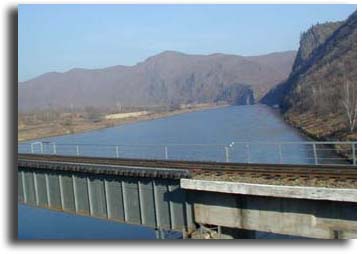 nice
river gorge, and passed a lot of little towns along the way. Life is
still pretty hard here. Everyone should take a look at how other people
live. It would certainly make them appreciate their lives much more.
The train is definitely the way to see a country. You get to peer into
people’s backyards and windows as you pass, and really catch a flavor of
life. It is getting dark. We are crammed into a soft sleeper
compartment again, but there is just enough room for our luggage and
us. It is quite cozy. Dinner soon. I hope we can find a bar car.
Dinner was – Chinese food. Imagine that! We drank them out of beer.
And that consists of a whole three bottles. We were casting an eye upon
the storage locker of Chinese wine, but were chased out of the car. At
that point, there really wasn’t much left to do but go to bed. So that
is what we did.
nice
river gorge, and passed a lot of little towns along the way. Life is
still pretty hard here. Everyone should take a look at how other people
live. It would certainly make them appreciate their lives much more.
The train is definitely the way to see a country. You get to peer into
people’s backyards and windows as you pass, and really catch a flavor of
life. It is getting dark. We are crammed into a soft sleeper
compartment again, but there is just enough room for our luggage and
us. It is quite cozy. Dinner soon. I hope we can find a bar car.
Dinner was – Chinese food. Imagine that! We drank them out of beer.
And that consists of a whole three bottles. We were casting an eye upon
the storage locker of Chinese wine, but were chased out of the car. At
that point, there really wasn’t much left to do but go to bed. So that
is what we did.
October 31
The train
ride down to Beijing was not particularly restful. Many of our group are
ill, and the train guards have been using our car as a thoroughfare.
Additionally, the train driver had to hit the brakes fairly hard several
times throughout the night, and so the night was pretty broken up.
Of interest were the train guards and mechanics.
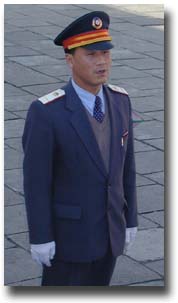 At
each stop, we would have each coach entrance guarded by a uniformed
railroad guard. And a mechanic would tap each wheelset, looking
for any wheel problems, and check the temperature of each axle, again
looking for problems. We inquired about the fact that you could
only exit one end of the coach, while the other end was specifically
locked. Apparently it is a way to make sure that only the people
who have a ticket to that stop get off there. The same was true on
leaving the station. You had to show your ticket to the station
exit guard so that they could see you were where you were supposed to
be. It got to be a little tedious, as (particularly in Beijing)
lots of people were trying to exit through very small portals. I
haven't mentioned it, but the people are pushy. They aren't
obnoxious pushy in the way of "Hey look at me, I'm important." But
rather everyone is just, well, rude by Western standards. It's not
wrong, but just different.
At
each stop, we would have each coach entrance guarded by a uniformed
railroad guard. And a mechanic would tap each wheelset, looking
for any wheel problems, and check the temperature of each axle, again
looking for problems. We inquired about the fact that you could
only exit one end of the coach, while the other end was specifically
locked. Apparently it is a way to make sure that only the people
who have a ticket to that stop get off there. The same was true on
leaving the station. You had to show your ticket to the station
exit guard so that they could see you were where you were supposed to
be. It got to be a little tedious, as (particularly in Beijing)
lots of people were trying to exit through very small portals. I
haven't mentioned it, but the people are pushy. They aren't
obnoxious pushy in the way of "Hey look at me, I'm important." But
rather everyone is just, well, rude by Western standards. It's not
wrong, but just different.
We did
arrive in Beijing right on time, which isn’t bad for a 24 hour trip.
We then headed off to Tianamen Square, only to be told that we did not
have permission to shoot there.
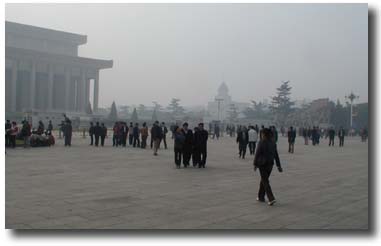 Which
was fine with me. The square is just a large plaza, filled with
people, and the day was hazy, smoggy, and gray. I made an
executive decision, and said that we were through shooting. I
called the camera rental people and gave them back the camera. And
I put them on the hunt for sixty seconds of useable HD footage of the
Square, the Forbidden City, and the Great Wall. It will easier to
buy the footage, than to go through the hassle of trying to shoot it.
It will be very interesting to see what happens when the Olympics are
held here in 2008, because the city will be flooded with video cameras.
And there will be hordes of journalists, looking for that one story, and
they will not take kindly to being told where, what, and when they can
shoot.
Which
was fine with me. The square is just a large plaza, filled with
people, and the day was hazy, smoggy, and gray. I made an
executive decision, and said that we were through shooting. I
called the camera rental people and gave them back the camera. And
I put them on the hunt for sixty seconds of useable HD footage of the
Square, the Forbidden City, and the Great Wall. It will easier to
buy the footage, than to go through the hassle of trying to shoot it.
It will be very interesting to see what happens when the Olympics are
held here in 2008, because the city will be flooded with video cameras.
And there will be hordes of journalists, looking for that one story, and
they will not take kindly to being told where, what, and when they can
shoot.
Not
shooting at the Forbidden City was the right choice. 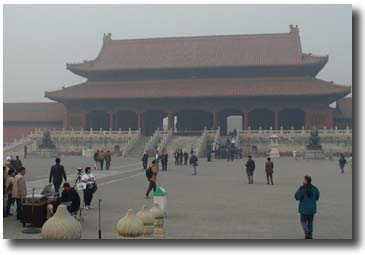 It is just too large, and I think we would have had problems with
the guards. As it was, it was pretty tiring just walking through
it. But it was a fascinating look at the Imperial Ruling Years of
China.
It is just too large, and I think we would have had problems with
the guards. As it was, it was pretty tiring just walking through
it. But it was a fascinating look at the Imperial Ruling Years of
China.
The peddlers and beggars around the area where not to be deterred.
John had about a half hour amusement buying seven (yes, seven) “genuine Rolex” watches for less than $20 US. It was pretty funny, as he just kept haggling and haggling. Of course, the small inner dials are bogus, and he got back a 20 ruble note as part of his change, but he did have fun none-the-less. But golly, they were all persistent.
We blew off dinner, and went back the hotel. And went around the corner to McDonalds, just to say we had been to one. I was going to go out to an Irish Bar after that, but I’m fading, and may just go to bed. It turns out that the famous Beijing Irish Bar has closed, a casualty of the SARS outbreak. Everyone agrees that the tour was fun, but we are all ready to go home.
November 1
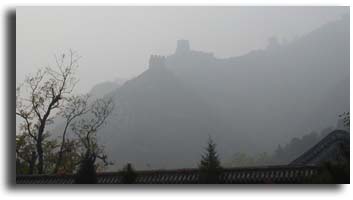 As
it was, it was just ghostly towers and walls, running along the
ridgelines. I climbed at the first guard station and thought I’d
have a stroke. The guards must have been tough guys to have
endured all the steps. It was rather awesome to walk a piece of
history, and wonder just how many feet had trod those same steps.
As
it was, it was just ghostly towers and walls, running along the
ridgelines. I climbed at the first guard station and thought I’d
have a stroke. The guards must have been tough guys to have
endured all the steps. It was rather awesome to walk a piece of
history, and wonder just how many feet had trod those same steps.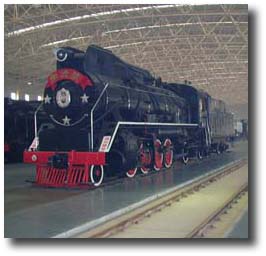 and
some of the past chairmen’s private cars. We then endured traffic
once again to have dinner at a Chinese pizza buffet. Well, at
least the beer was cold. But it was sort of like the Mongol hordes
descending on this place. We cleaned them out of food in short
order. Then it was back to the hotel to pack for the long flight
tomorrow and our impending fight with customs over our impounded camera.
Our Chinese American attorney has been on the phone twice with me today.
I think she has a point to prove with the customs guys.
and
some of the past chairmen’s private cars. We then endured traffic
once again to have dinner at a Chinese pizza buffet. Well, at
least the beer was cold. But it was sort of like the Mongol hordes
descending on this place. We cleaned them out of food in short
order. Then it was back to the hotel to pack for the long flight
tomorrow and our impending fight with customs over our impounded camera.
Our Chinese American attorney has been on the phone twice with me today.
I think she has a point to prove with the customs guys.
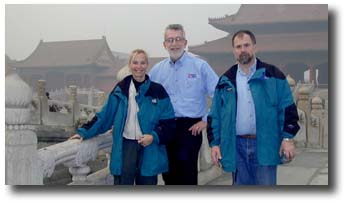 seen more than the average tourist. That’s one reason why I would
highly recommend these Trains Unlimited Tours trips. They are mild
adventure trips. You endure some minor inconveniences, but you
really get to see the country and the people, no matter where you go.
You meet new friends and see things that ordinary folks don’t get to
experience. What are my impressions of China? Booming and an
economic powerhouse waiting to come into it’s own. Yes, there is a
certain poverty mentality here. Which means that nothing gets fixed.
But I think they will get over that as the standard of living improves.
Driving is unbelievable, and there really doesn’t seem to be much
attention paid to environmental impact in the march toward prosperity.
It is an issue that the country will eventually have to face. The
people are friendly and inquisitive. They are quite open to Westerners,
even though we were often a curiosity. The pace is high, the
hustle and bustle is high, and is quite an impressive place to visit.
Cell service is universal, and internet access is common. If you
come, don’t go just to the big cities. Get out into the rural
areas. See smaller towns. Watch the LED traffic lights
control the burro carts mixed with new Audis. See the farmers
stack up huge mounds of cornstalks for fodder. See endless miles
of rice, all harvested by hand. Look into backyards and see wash
on the line. See humble housing next to pretty modern apartments.
Experience night driving on bumpy back rounds. Listen to the sound of
the three wheel trucks. Try to cross the street on your own.
Ride the trains. Go to the markets. Eat noodle soup.
Watch the countdown clocks on the traffic lights and the running man
signs. See the neon. Smell the smells and taste the tastes –
of China.
seen more than the average tourist. That’s one reason why I would
highly recommend these Trains Unlimited Tours trips. They are mild
adventure trips. You endure some minor inconveniences, but you
really get to see the country and the people, no matter where you go.
You meet new friends and see things that ordinary folks don’t get to
experience. What are my impressions of China? Booming and an
economic powerhouse waiting to come into it’s own. Yes, there is a
certain poverty mentality here. Which means that nothing gets fixed.
But I think they will get over that as the standard of living improves.
Driving is unbelievable, and there really doesn’t seem to be much
attention paid to environmental impact in the march toward prosperity.
It is an issue that the country will eventually have to face. The
people are friendly and inquisitive. They are quite open to Westerners,
even though we were often a curiosity. The pace is high, the
hustle and bustle is high, and is quite an impressive place to visit.
Cell service is universal, and internet access is common. If you
come, don’t go just to the big cities. Get out into the rural
areas. See smaller towns. Watch the LED traffic lights
control the burro carts mixed with new Audis. See the farmers
stack up huge mounds of cornstalks for fodder. See endless miles
of rice, all harvested by hand. Look into backyards and see wash
on the line. See humble housing next to pretty modern apartments.
Experience night driving on bumpy back rounds. Listen to the sound of
the three wheel trucks. Try to cross the street on your own.
Ride the trains. Go to the markets. Eat noodle soup.
Watch the countdown clocks on the traffic lights and the running man
signs. See the neon. Smell the smells and taste the tastes –
of China.